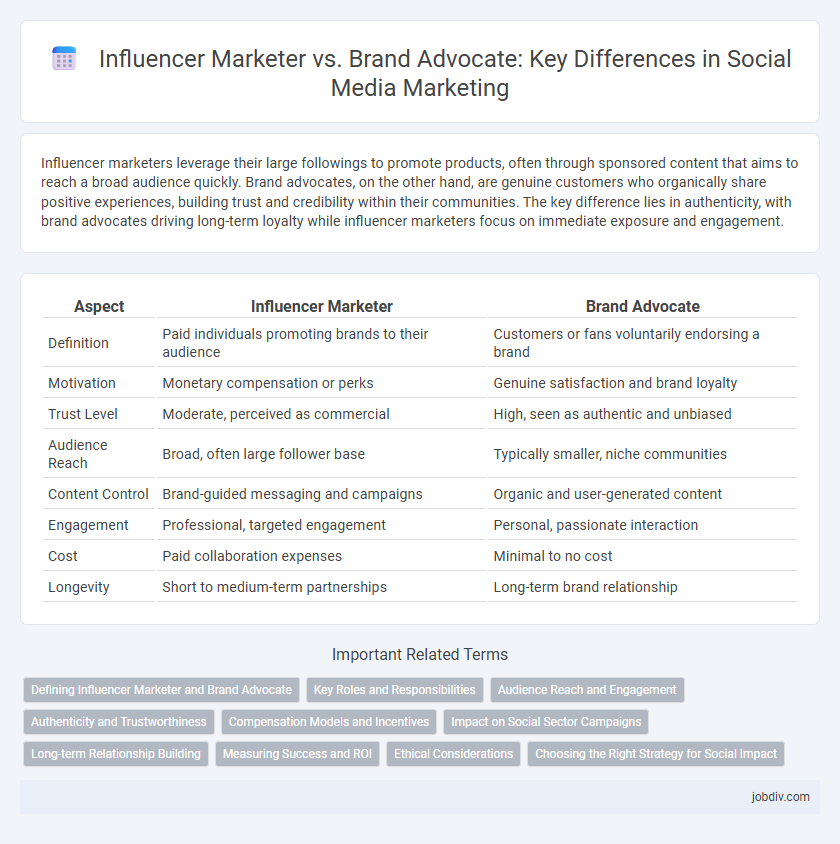Influencer marketers leverage their large followings to promote products, often through sponsored content that aims to reach a broad audience quickly. Brand advocates, on the other hand, are genuine customers who organically share positive experiences, building trust and credibility within their communities. The key difference lies in authenticity, with brand advocates driving long-term loyalty while influencer marketers focus on immediate exposure and engagement.
Table of Comparison
| Aspect | Influencer Marketer | Brand Advocate |
|---|---|---|
| Definition | Paid individuals promoting brands to their audience | Customers or fans voluntarily endorsing a brand |
| Motivation | Monetary compensation or perks | Genuine satisfaction and brand loyalty |
| Trust Level | Moderate, perceived as commercial | High, seen as authentic and unbiased |
| Audience Reach | Broad, often large follower base | Typically smaller, niche communities |
| Content Control | Brand-guided messaging and campaigns | Organic and user-generated content |
| Engagement | Professional, targeted engagement | Personal, passionate interaction |
| Cost | Paid collaboration expenses | Minimal to no cost |
| Longevity | Short to medium-term partnerships | Long-term brand relationship |
Defining Influencer Marketer and Brand Advocate
An Influencer Marketer is a professional who collaborates with social media personalities to promote products or services through sponsored content, leveraging their audience reach for brand visibility. A Brand Advocate is a loyal customer or employee who voluntarily endorses and shares positive experiences about a brand without direct compensation. Both play critical roles in social media strategies, but Influencer Marketers focus on paid collaborations, whereas Brand Advocates drive authentic, organic word-of-mouth promotion.
Key Roles and Responsibilities
Influencer marketers create sponsored content to promote brands through their social media channels, leveraging their large, engaged followings to drive product awareness and sales. Brand advocates, often loyal customers or employees, share authentic testimonials and organic endorsements, enhancing brand credibility and trust among their personal networks. Both play crucial roles in shaping brand perception, with influencers focusing on reach and engagement, while advocates emphasize genuine support and long-term relationship building.
Audience Reach and Engagement
Influencer marketers typically leverage large, diverse audiences on platforms like Instagram and TikTok, generating high reach but often with variable engagement depending on campaign authenticity. Brand advocates usually have smaller, highly loyal audiences who trust their genuine endorsements, resulting in deeper engagement and stronger influence on purchasing decisions. Choosing between the two depends on whether the goal is broad exposure or meaningful interaction within a niche community.
Authenticity and Trustworthiness
Influencer marketers often rely on paid partnerships to promote products, which can sometimes affect their perceived authenticity among audiences. Brand advocates, typically existing loyal customers, share genuine positive experiences that build deeper trust and credibility with potential consumers. Trustworthiness is heightened when endorsements come from authentic interactions rather than sponsored content, making brand advocates more influential in fostering long-term brand loyalty.
Compensation Models and Incentives
Influencer marketers typically receive monetary compensation based on fixed fees, performance metrics, or commission structures tied to campaign goals, whereas brand advocates often engage voluntarily or receive non-monetary incentives such as discounts, exclusive access, or product gifts. Compensation models for influencer marketers emphasize measurable ROI through tracking clicks, sales, or impressions, while brand advocates focus on authentic promotion driven by personal loyalty and intrinsic motivation. Brands invest in influencer marketing for scalable reach and precise targeting, leveraging paid partnerships, whereas brand advocacy programs prioritize fostering long-term customer relationships and organic word-of-mouth promotion.
Impact on Social Sector Campaigns
Influencer marketers leverage their large followings to amplify campaign messages rapidly, driving widespread visibility and engagement for social sector causes. Brand advocates, often passionate volunteers or beneficiaries, provide authentic, grassroots support that builds trust and long-term commitment within communities. Combining influencer reach with advocate sincerity maximizes impact, enhancing both awareness and deeper social change outcomes in nonprofit campaigns.
Long-term Relationship Building
Influencer marketers leverage paid collaborations to create brand awareness, often targeting short-term campaigns with measurable reach and engagement metrics. Brand advocates develop genuine, organic loyalty through authentic experiences, fostering trust and sustained customer relationships over time. Prioritizing long-term relationship building, brand advocates drive enduring brand credibility and customer retention beyond immediate promotional gains.
Measuring Success and ROI
Measuring success in influencer marketing involves tracking key metrics such as engagement rates, conversion rates, and audience reach, which provide quantifiable data on campaign performance and ROI. Brand advocates, often customers or employees, generate organic word-of-mouth promotion that may be less measurable but delivers high trust and long-term brand loyalty. Combining analytics tools with sentiment analysis enhances understanding of ROI by capturing both direct sales impact and brand reputation effects.
Ethical Considerations
Influencer marketers often prioritize reach and engagement metrics, which can lead to ethical concerns about transparency and authenticity in sponsored content. Brand advocates, typically genuine customers or employees, provide more credible and trustworthy endorsements that align with ethical marketing practices. Maintaining honesty and clear disclosure in both roles is essential to uphold consumer trust and comply with advertising regulations.
Choosing the Right Strategy for Social Impact
Influencer marketers leverage large audiences and paid promotions to drive brand awareness quickly, making them ideal for short-term campaigns targeting mass engagement. Brand advocates, often loyal customers or employees, generate authentic, trust-based recommendations that enhance long-term brand credibility and foster community growth. Selecting between influencer marketing and brand advocacy depends on campaign goals, budget, and the desired level of audience trust and sustained social impact.
Influencer Marketer vs Brand Advocate Infographic

 jobdiv.com
jobdiv.com